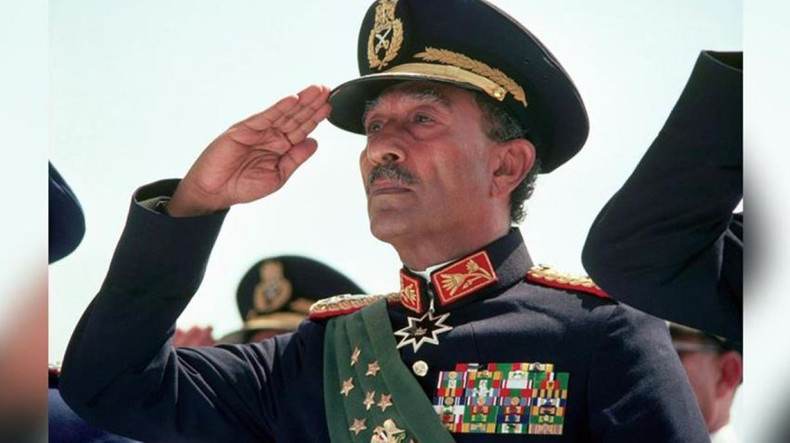Muhammad Anwar es-Sadat (25 December 1918 – 6 October 1981) was an Egyptian politician and military officer who served as the third president of Egypt from 15 October 1970 until his assassination by fundamentalist army officers on 6 October 1981. Sadat was a senior member of the Free Officers, the group that overthrew King Farouk I during the Egyptian Revolution of 1952. He was a close confidant of President Gamal Abdel Nasser, under whom he served as vice president twice before succeeding him as president in 1970. In 1978, Sadat and Menachem Begin, the Prime Minister of Israel, signed a peace treaty in cooperation with United States President Jimmy Carter. This effort earned them the Nobel Peace Prize.
During his 11 years as president, Sadat changed Egypt’s trajectory by moving away from many of Nasser's political and economic ideologies. He reinstituted a multi-party system and launched the Infitah economic policy. He led Egypt in the Yom Kippur War of 1973 to regain the Sinai Peninsula, which Israel had occupied since the Six-Day War of 1967. This military action made him a hero in Egypt and, for a time, across the wider Arab world. Following the war, he negotiated with Israel, culminating in the Camp David Accords and the Egypt-Israel peace treaty. This achievement won him and Begin the Nobel Peace Prize, making Sadat the first Muslim Nobel laureate.
Reaction to the peace treaty, which resulted in the return of Sinai to Egypt, was generally favourable among Egyptians. However, it was rejected by the Muslim Brotherhood and the left, who felt Sadat had abandoned the Palestinian cause. Except for Sudan, the Arab world and the Palestine Liberation Organization (PLO) strongly opposed Sadat's efforts to pursue a separate peace with Israel without prior consultations with other Arab states. His refusal to reconcile over the Palestinian issue led to Egypt's suspension from the Arab League from 1979 to 1989. The peace treaty was one of the primary factors that resulted in his assassination; on 6 October 1981, militants led by Khalid Islambouli opened fire on Sadat with automatic rifles during a parade in Cairo, killing him.
Early Life
Anwar Sadat was born on 25 December 1918 in Mit Abu El Kom, located in Monufia Governorate in the Sultanate of Egypt. He came from a poor family and had 14 siblings. One of his brothers, Atef Sadat, became a pilot and was killed in action during the Yom Kippur War in 1973. His father, Anwar Mohammed El Sadat, was Upper Egyptian, and his mother, Sit Al-Berain, had an Egyptian mother and a Sudanese father.
Sadat graduated from the Royal Military Academy in Cairo in 1938 and was appointed to the Signal Corps. He entered the army as a second lieutenant and was posted to the Anglo-Egyptian Sudan (a condominium under joint British and Egyptian rule at the time). There, he met Gamal Abdel Nasser, and along with several other junior officers, they formed the Free Officers, an organization devoted to overthrowing British rule in Egypt and eliminating state corruption.
During World War II, Sadat collaborated with Nazi German spies in Egypt as part of Operation Salam. Once discovered by British authorities, he was arrested and imprisoned for much of the war. By the end of the conflict, he had met with a secret society that plotted to assassinate Amin Osman, the Minister of Finance in the Wafd Party government and head of the Egyptian-British Friendship Society, because of his strong pro-British sentiments. Osman was assassinated in January 1946. Following this event, Sadat was imprisoned again.
In Qarmidan prison, Sadat faced severe hardships, including solitary confinement. He was among the first accused in the Hussein Tawfiq case. After evidence of wrongdoing was found to be lacking, the charges were dropped, and the suspected individuals were released. Salah Zulfikar, then a young police officer in charge of the prison, recognized Sadat's patriotic role and believed he had been imprisoned unjustly. Zulfikar provided him with food, newspapers, and cigarettes and helped his family obtain visitor permits.
Sadat was active in various political movements, including the Muslim Brotherhood, the fascist Young Egypt, the pro-Axis Iron Guard of Egypt, and the Free Officers. Along with his fellow Free Officers, he participated in the military coup that resulted in the Egyptian Revolution of 1952, which overthrew King Farouk I on 23 July. Sadat delivered the first radio statement of the revolution to the Egyptian people.
Presidency
Some major events during Sadat's presidency include his "Corrective Revolution" aimed at consolidating power, a break with Egypt's long-time ally and aid-giver, the USSR, the 1973 October War with Israel, the Camp David Accords, the Egypt–Israel peace treaty, the economic policy known as "opening up" (or Infitah), and ultimately, his assassination in 1981.
Sadat succeeded Nasser as president after Nasser's death in October 1970. Initially, Sadat was expected to have a short presidency. Many Nasser supporters within the government viewed him as a figure who could be easily manipulated. However, Sadat surprised everyone with astute political manoeuvres that enabled him to retain the presidency and establish himself as a leader in his own right.
On May 15, 1971, Sadat announced his Corrective Revolution, which involved purging the government and security establishments of the most ardent Nasserists. He also encouraged the rise of an Islamist movement that had been suppressed under Nasser. Seeing the Islamists as socially conservative, he granted them considerable cultural and ideological autonomy in return for their political support.
In 1971, during the Jarring Mission and three years into the War of Attrition in the Suez Canal zone, Sadat endorsed a letter proposing peace based on the UN negotiator Gunnar Jarring's proposals, which included Israel withdrawing from its pre-war borders. Unfortunately, this peace initiative failed as neither Israel nor the United States accepted the terms discussed at that time.
